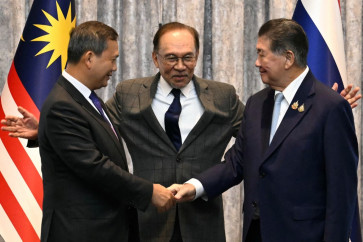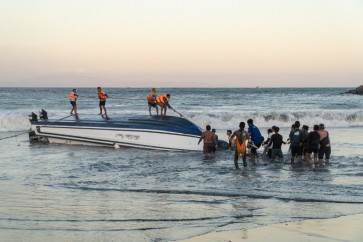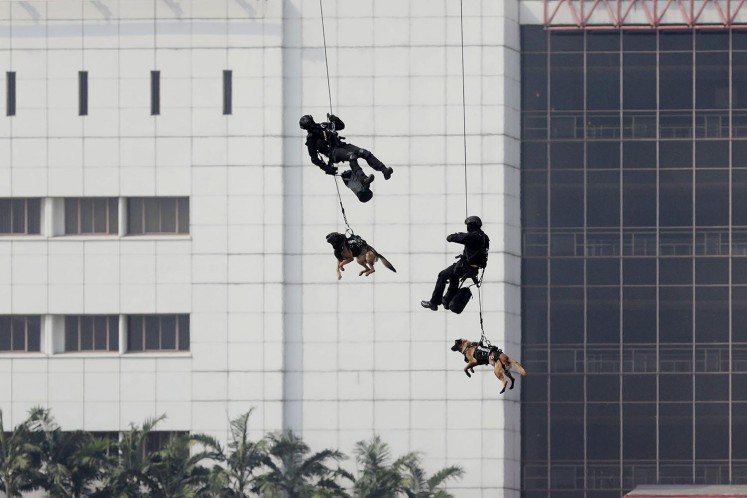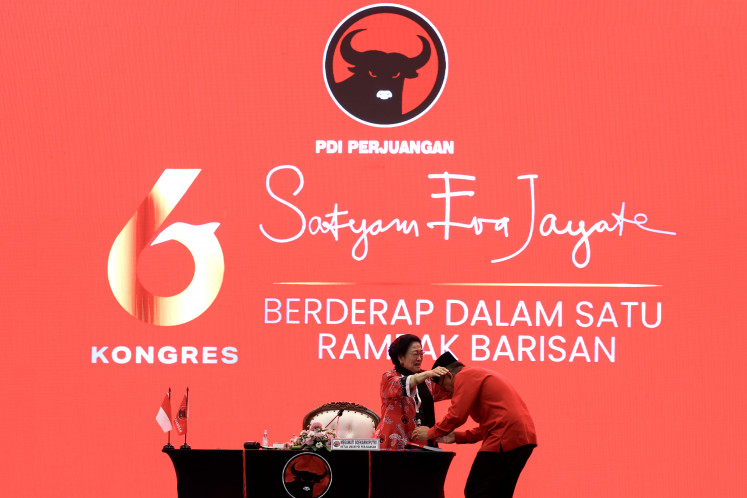Popular Reads
Top Results
Can't find what you're looking for?
View all search resultsPopular Reads
Top Results
Can't find what you're looking for?
View all search resultsConflict resolution through music
Named after a traditional drink that warms the body, Bajigur youth reggae band has a noble mission of putting an end to brawls among youths
Change text size
Gift Premium Articles
to Anyone
N
amed after a traditional drink that warms the body, Bajigur youth reggae band has a noble mission of putting an end to brawls among youths.
Umar, 17, the band’s lead vocalist, used to take part in brawls between youths of Matraman in East Jakarta and those of neighboring Manggarai subdistricts in Central Jakarta.
According to him, long-time rivalry between music groups within the two neighborhoods was the source of the recurring conflicts.
Umar said that last year he was introduced to a youth music community in a neighboring area.
“I was interested in joining it but the group leader told me they wanted a commitment from my band to come regularly to practice. I agreed,” he said, adding that he and his band became so preoccupied with practice, they didn’t have time to fight anymore.
Bajigur then became one of 15 bands linked to the Common Music Community (KMB), which owns a recording studio in Proklamasi, Central Jakarta.
KMB, established in January 2008, has recorded two songs, “Brother Junky” and “Cuekin Aje” (Ignore it), to make young people aware of their potential to develop, and of the dangers of using drugs.
They are now in the process of recording a third song, “Waktu Hujan Sore-sore” (When the rain falls in an afternoon), reflecting the same theme. KMB sells the recordings at Rp 10,000 (US$1.2) each.
Now, thanks to the community outreach approach, brawls between Matraman and Manggarai youths have come to an end.
KMB leader, Randi, told the The Jakarta Post that he saw great talent in the music groups. “Asking them to regularly come to our music studio for practice is the only way to make them so busy that they forget all about vengeance,” he said.
KMB is one of the community groups supervised by nongovernmental organization (NGO), Nurani Dunia. The NGO also runs programs focused on fish breeding, education, re-greening, interfaith dialogues and women’s empowerment.
Nurani Dunia program manager, Muhammad Jufri, recalled the story of Bajigur as how one community-initiated program succeeded in overcoming brawls between local youths.
”After a long and tiring process, the two conflicted groups finally made peace with each other after they found they had a common interest in music,” he said.
Nurani Dunia initiator, sociologist Imam Prasodjo, told the Post that involving the people in initiating programs to empower their communities would nurture a sense of pride in their environments and thus encourage them to promote similar activities toward others.
Commenting on the city administration’s initiative to form an integrated team to anticipate future violent confrontations among residents, Imam said that forming a team consisting of various professionals, or installing closed-circuit television (CCTV) in brawl-prone areas would be praiseworthy but ineffective unless residents were actively involved in an empowering way.
“True peace among conflicting groups can occur only if these groups willingly decide to end the conflicts and sincerely accept each other. Outsiders, in these cases government officials and others who want to help the conflicting groups, can only mediate or support them in seeking resolution.
“The will to have peace should come from the people,” he said, responding to an initiative by the city’s administration to reconcile residents involved in a brutal confrontation near Pasar Rumput market in South Jakarta on July 2.
The brawl, between residents of nearby Menteng Tenggulun subdistrict in Central Jakarta and Pasar Manggis in South Jakarta, injured dozens of residents and caused extensive damage to a nearby Transjakarta busway shelter.
Representatives of the residents involved in the fight signed a peace pact on July 7 at the Cut Mutia Mosque in Central Jakarta.
According to Imam, developing cross-cutting facilitations to create interactive and participatory activities among various groups is a way to deal with existing conflicts and prevent fighting in the future.
He thus proposes the idea of bridging and linking resources to create sustainable empowerment programs as a way to resolve communal conflicts.
“Each community group has its own resources. What we need is to raise awareness among the people of their own potential, and the needs of others, so that they are willing to interact with each other to exchange resources,” he said.
He added that mediators, such as local administrations, could help by linking resources, including skills and knowledge, from the various communities to support them in building networks. (msa)










